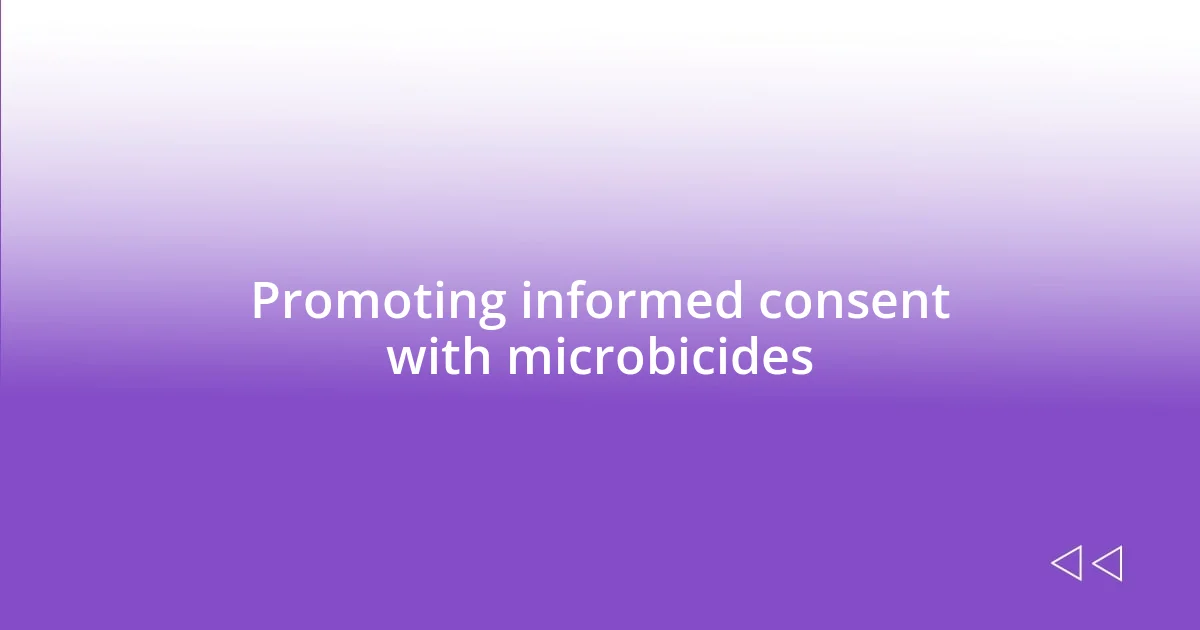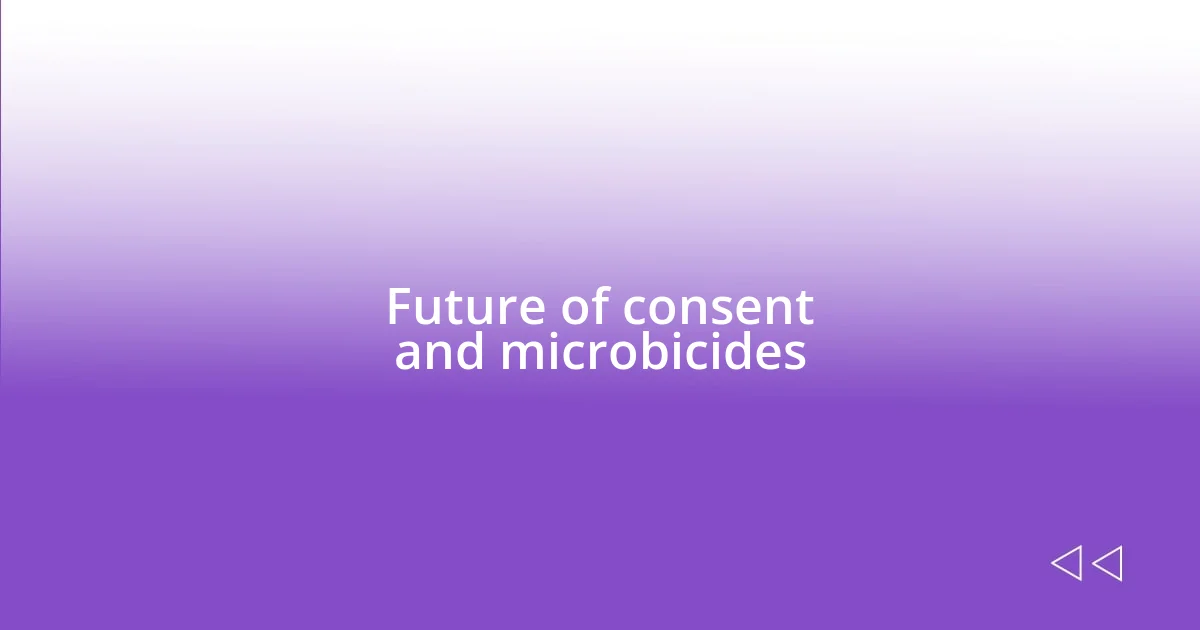Key takeaways:
- Consent in relationships is a dynamic conversation, requiring continuous communication and an awareness of evolving boundaries to deepen trust and emotional intimacy.
- Microbicides empower individuals to take control of their sexual health, fostering open discussions about safety and mutual pleasure while reducing the risk of STIs.
- Promoting informed consent around microbicides involves meaningful conversations that enhance understanding and respect, evolving as relationships grow and change.

Understanding consent in relationships
Consent in relationships is more than just a yes or no; it’s a dynamic conversation. I remember a time when a partner and I were discussing boundaries. It felt liberating to openly share what we were comfortable with, and I realized that this dialogue only deepened our connection. Isn’t it amazing how much trust grows when both people feel seen and heard?
In my experience, consent can sometimes be misunderstood or overlooked. I often wonder, how many times have we nodded along, even when we were unsure? It’s crucial to remember that consent should never be assumed. Each time we take a step forward in intimacy, we should check in with one another. This practice not only respects personal limits but also enriches emotional intimacy.
Moreover, consent can evolve in relationships. I once encountered a situation where my comfort level changed as our relationship deepened. I hesitated to voice that change, fearing it might upset my partner. But when I finally shared my feelings, it led to a more honest conversation. How can we truly connect if we’re not honest about our needs and boundaries? A relationship thrives on continuous communication, and recognizing this can lead to profound growth for both partners.

Defining microbicides in sexual health
Microbicides, in the context of sexual health, are substances designed to reduce the transmission of sexually transmitted infections (STIs) when applied topically. I often think about how they offer a significant option for individuals seeking to take control of their sexual health. Imagine being able to actively participate in your own protection, rather than solely relying on partners. That sense of agency can be empowering.
When I first learned about microbicides, I was surprised by the variety of formulations available, such as gels or films, each tailored to different needs. I recall a heart-to-heart with a friend who was hesitant about using protection. Introducing the concept of microbicides sparked a deeper conversation about safety and choices in our intimate lives. This adaptability can be a game-changer, especially in empowering those who may not feel comfortable negotiating condom use.
It’s also worth noting that microbicides not only help in preventing STIs but can also enhance pleasure for both partners. I remember discussing this with a group of friends over coffee, where the idea of incorporating microbicides felt like rekindling a spark in our intimate lives. How often do we overlook pleasure in discussions about protection? With the right information, microbicides can transform how we approach sexual encounters, combining safety with enjoyment.
| Type | Function |
|---|---|
| Topical Gels | Applied before intercourse to reduce STIs |
| Films | Disolves upon contact, providing protection |

Microbicides and sexual autonomy
Microbicides present a fascinating intersection of sexual autonomy and personal empowerment. When I first explored the idea of microbicides, it brought to mind an experience where a friend shared how they felt disempowered in their intimate life, often deferring to partners’ choices around safety. Realizing that microbicides could provide an alternative route for autonomy sparked a palpable shift in her confidence. It’s transformative to think that individuals can take proactive steps for their own protection, enhancing not just safety but also their sense of self-determination.
- Microbicides empower individuals to take charge of their sexual health.
- They can foster open conversations about safety and preferences between partners.
- Using microbicides allows for mutual pleasure while reducing the risk of STIs.
- This approach can help bridge conversations about consent, making it a continuous dialogue rather than a one-time agreement.
My own adventure with introducing microbicides in discussions unveiled another layer of independence in sexual relationships. I remember when I suggested them to a partner during a vulnerable moment; it sparked a sense of partnership where we could both share responsibilities. It felt incredibly liberating to know that taking care of health could also include pleasure, challenging that outdated notion that safety equates to diminished experience. Empowering ourselves with tools like microbicides is a way of claiming our right to enjoy intimate moments fully, knowing that we have the means to protect ourselves.

Ethical considerations of microbicide use
When discussing ethical considerations of microbicide use, we can’t overlook the question of consent. It’s fascinating to me how microbicides can shift the dynamics of sexual encounters. I often think about consent as a continuous conversation, and the ability for one partner to take protective measures independently can empower both individuals. But it raises a pressing question: how should we navigate situations where one partner might use microbicides without the other’s knowledge? This can evoke feelings of betrayal or mistrust if not openly communicated.
Another layer to consider is the impact of cultural attitudes toward sexual health. I remember attending a workshop where participants shared their hesitations about new contraceptive methods, including microbicides. It became clear that personal beliefs and societal norms play critical roles in how individuals approach their sexual health options. There’s a delicate balance between advocating for personal autonomy and ensuring that the preferences and values of both partners are respected. I often ponder: what strategies can we develop to promote open dialogues that honor these diverse perspectives?
Finally, we must also address accessibility to microbicides. The idea that everyone should have equal access to protective measures aligns with my values of social justice. I’ve seen how socioeconomic factors greatly influence individuals’ choices about sexual health, sometimes leaving the most vulnerable populations without resources. It can be heartbreaking to realize that while microbicides have the potential to empower, access barriers might limit their effectiveness. How can we advocate for greater availability and make sure that everyone, regardless of background, can participate in their own sexual health journey? These ethical questions shape how we understand and implement microbicide use in real-world settings, highlighting the importance of thorough discourse.

Promoting informed consent with microbicides
Promoting informed consent around microbicides involves more than just sharing information; it’s about sparking meaningful conversations. I fondly recall a moment during a casual dinner with friends when the topic of sexual health arose. The discussion shifted towards microbicides, and I was amazed to see how curious everyone became. People started asking questions, leading to an enlightening exchange about preferences and limits. This kind of open dialogue could significantly enhance understanding, ultimately reinforcing the concept of consent.
The emotional weight of informed consent hit home for me when I experienced a partner-sharing session about safe sex practices. My partner and I explored the topic of microbicides together, which created a safe space for us to express our thoughts and feelings. I felt a rush of trust and openness; the conversation not only informed us but also deepened our connection. In these moments, it becomes clear that informed consent is not just a checklist; it’s about mutual respect and understanding that evolves as we communicate.
Navigating the complexities of microbicide use can sometimes feel overwhelming. I often wonder, how do we ensure that every individual’s choice is respected without falling into the trap of assumptions? Each interaction could open doors to better awareness and education, empowering individuals to embark on their sexual health journeys with clarity. I believe that fostering an atmosphere where questions are welcomed transforms consent into a fluid conversation instead of a static agreement, ultimately leading to healthier relationships.

Future of consent and microbicides
Thinking about the future of consent and microbicides, I often reflect on the potential for greater autonomy in sexual health. Imagine a world where individuals feel empowered to make informed decisions about their protection, free from stigma or miscommunication. I picture myself in a discussion group, where everyone shares their thoughts on using microbicides. Suddenly, the atmosphere shifts; the air crackles with curiosity and mutual respect. That kind of environment could revolutionize how we view consent—it becomes a shared journey, not just a transaction.
The advancement of technology might also play a significant role in this future. Personally, I find it exciting to consider the possibilities of apps connecting partners for discussions around sexual health. How can technology not only provide information about microbicides but also facilitate ongoing conversations? I remember a friend sharing how they used a chat app to discuss their use of contraceptives openly. It turned a potentially awkward situation into a candid exchange that strengthened their bond. The idea of integrating such tools in everyday life really makes me hopeful for more open dialogues around consent.
Lastly, I believe education will be the cornerstone of this evolving landscape. I often visualize workshops in schools where students engage in role-playing exercises centered around consent and microbicides. What if learning about these topics was as engaging and normalized as discussing relationships? From my experience, this kind of proactive education would not only demystify microbicides but also create a culture where open conversations about consent thrive. The more we talk, the more we dispel misconceptions and build a community grounded in respect and empathy.












